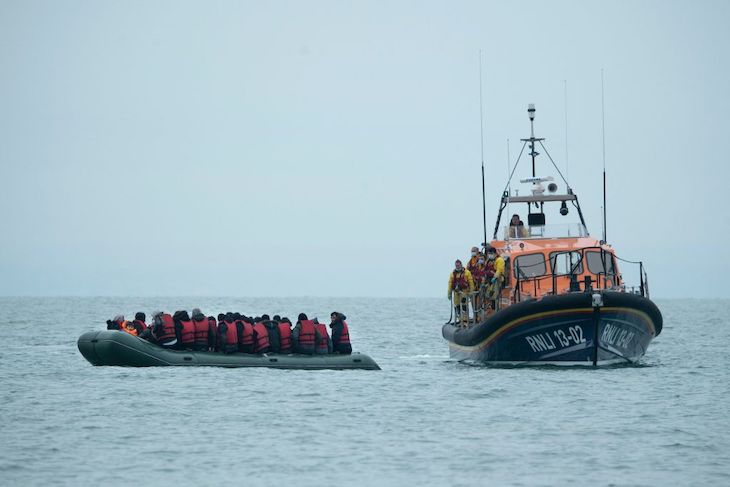The government’s inability to control our maritime border is a public scandal. Bold action is needed to make crossing the Channel pointless and put the people smugglers out of business. This will be impossible without major legal reform. So it is good news that the government is about to introduce new legislation to Parliament.
The government’s Rwanda plan was well-intentioned. However, it not supported by a legislative mandate and was, predictably, challenged in the courts. In June last year, an attempt to implement the plan was blocked by a last-minute intervention by the European Court of Human Rights. The legal challenge in our courts continues and even if the government in the end prevails, the Strasbourg Court may still say no.
So, the existing legal framework is unworkable and legislative reform is required. The shape that legislation should take, in order to avoid repeating past failures, was set out in a recent paper for Policy Exchange, which I wrote with Sir Stephen Laws, a former First Parliamentary Counsel. We argued that Parliament should impose a legal duty on the Home Secretary to remove from the UK any person who arrives in the UK unlawfully (without entry clearance) on a small boat from a safe state, such as France. If reports are accurate, the new Bill, due to be unveiled today, is to impose such a duty.
The new legislation should apply only to those who arrive on a small boat, not to other unlawful migrants
The legislation should spell out that the only limits on the Home Secretary’s duty are, first, that no one should be removed if they are not fit to fly; and second, no one should be removed (returned) to a country where they are likely to face persecution. The first limit would only delay removal until the person was fit to fly; the second limit reflects the terms of the Refugee Convention 1951 and would not stop removal to some other country or to a British Overseas Territory.
But whom should the Home Secretary remove? The new legislation should apply only to those who arrive on a small boat, not to other unlawful migrants. The Channel crisis warrants a bespoke regime. Other types of unlawful migration vary widely and are less clear-cut. It would be a mistake to apply the new legislation to all those who have already arrived on a small boat. This would needlessly compound the logistical challenge of implementing the new policy. Parliament should provide that the legislation will apply to anyone who arrives on a small boat on or after the date in which the legislation is first introduced to Parliament. If it were to apply to those who arrive only after the date of royal assent, this would encourage a surge in crossings.
The duty to remove should apply to families travelling with children, provided that no family group is ever broken up in the process. More controversially, it should also apply to unaccompanied children (typically teenage boys). This is necessary to avoid legal challenges to age assessment frustrating the policy and to stop incentivising children from crossing or being forced to cross the Channel. Removal from the UK is consistent with the government taking responsibility for their protection outside the UK, in British Overseas Territories or safe third countries.
Resolving the Channel crisis requires clear enforcement of a policy of removal without exception. Only such a policy will make it futile to contract with people smugglers. The policy will fail if its implementation is frustrated in the courts. New legislation is required in order to anticipate and disarm the likely grounds of legal challenge. The legislation must disapply modern slavery legislation, which will otherwise, as in this past year, be deployed to delay removal and to provide an opportunity to abscond before removal can take place.
The legislation must also disapply the key provisions of the Human Rights Act 1998, ruling out litigation that invents new exceptions (or obstacles) to the duty to remove or aims to invite the courts to denounce the legislation as incompatible with human rights. Whether the legislation is justified is for Parliament itself to decide. And if Parliament enacts legislation that mandates removal from the UK, the courts should not be left free to stymie it, whether by way of human rights litigation or ordinary judicial review. The legislation should also specify that the Home Secretary’s duty is not restrained by ‘interim measures’ made by the European Court of Human Rights.
The government might hope that in the end it will win human rights litigation challenging implementation of any new legislation. Maybe. But it would be rash to take the chance, not least since this would inevitably introduce delay, enabling opponents of the legislation to frustrate implementation of the policy, during which time tens of thousands more may cross.
For new legislation to help resolve the crisis, it must require removal from the UK of all who continue to cross the Channel in small boats. To be workable, the legislation must avoid permitting ministers to make exceptions, which will give rise to litigation, or enabling courts to make exceptions, which will have perverse incentives and will keep the people smugglers in business. The question for Parliament will be whether the new Bill rises to this challenge.






Comments